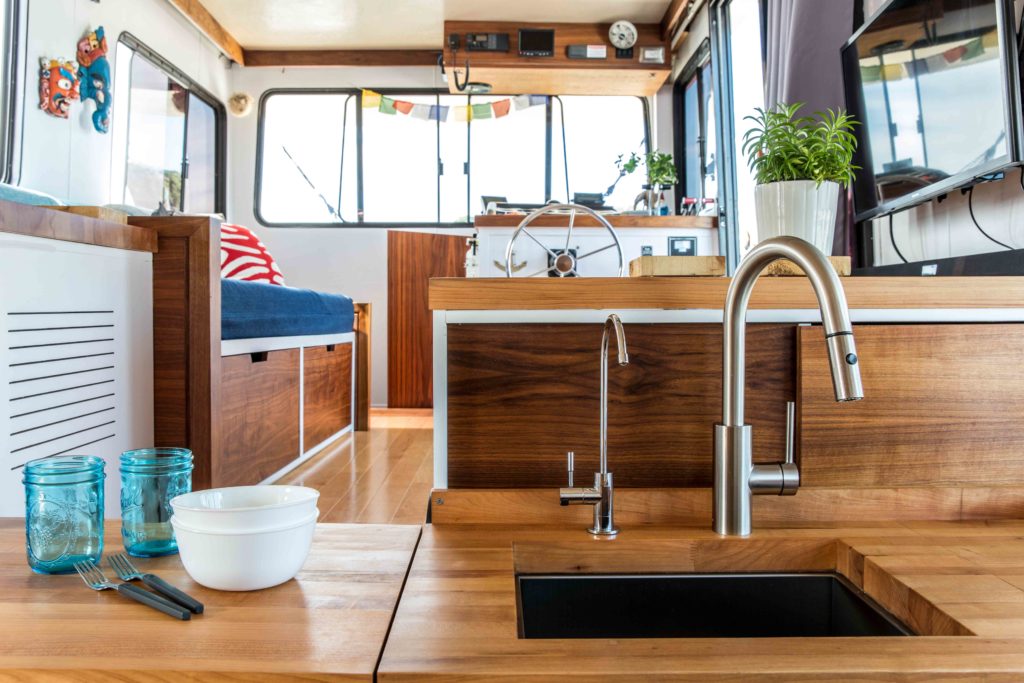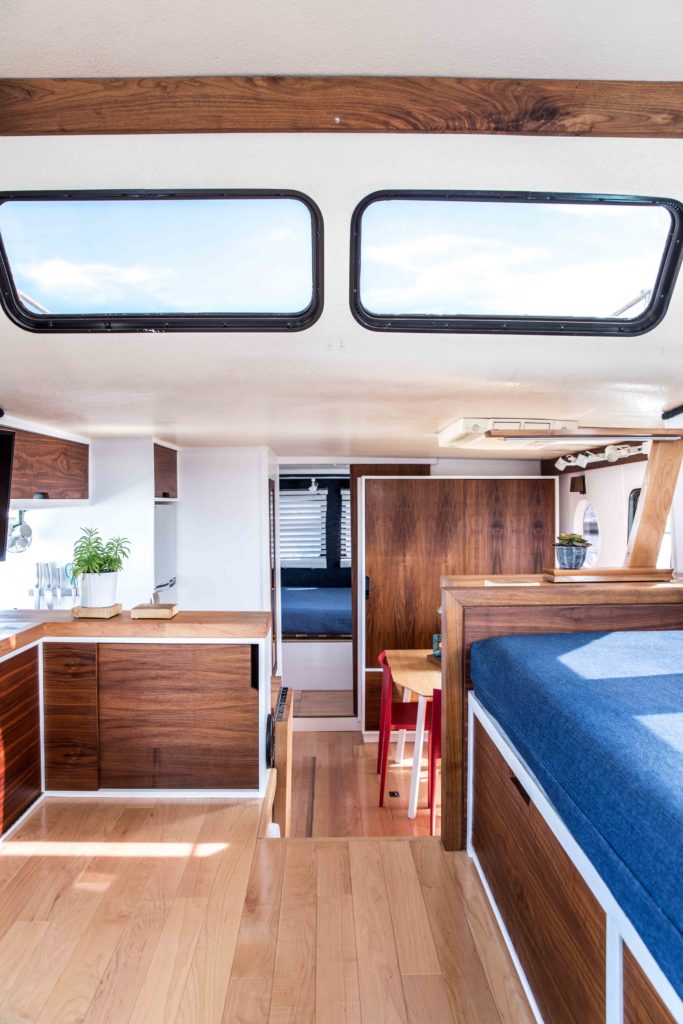Little House on the Harbor
A design-oriented couple turns a vintage houseboat into a minimalist’s dream home

As the sun dips toward the Portland skyline, it begins to paint the inside of Jillian Welenc and Matthew Varley’s houseboat in soft golden tones, washing over the maple butcher-block counters and the walnut cabinets. “They’re not woods you might normally see in a boat,” Varley says of the sleek surfaces, all of which the licensed architect crafted himself in his woodworking studio. “Contemporary boatmakers seem to use a lot of plastic, a lot of fake wood. There’s nothing worse than the feeling of plastic under your feet. I wanted to use real materials.”
The houseboat is tiny, but it packs a lot of style and (relative) luxury into its 280-square-foot living space. “The square footage is so small, we could afford to splurge,” says Welenc, who works as an interior designer in downtown Portland. The couple—who together form Bottega Miscellanea, a two-person architecture and interior design firm that serves New England—were able to use quality materials and finishes to upgrade their houseboat. They created solid wood cabinets for the kitchen and bedroom, designed midcentury modern–inspired built-in sofas for the main living area, and installed houndstooth wallpaper in the bathroom. “Matt really got to showcase his woodworking skills,” Welenc says. One of her favorite touches is the shower. They replaced the worn-out plastic drop-in shower with an en-suite wooden room that opens to the sky. “He made it like an outdoor shower, with a slated roof hatch,” she says. “That’s his monumental moment.”
For almost four years, this floating one-bedroom, one-bathroom home was the couple’s primary residence. After purchasing it in 2015, they lived full-time on the houseboat, docked in Boston Harbor. “We lived on it, un-renovated, for a bit over a year,” Welenc explains. “It was bad. But we wanted to figure out what we wanted to improve.” The renovation went quickly, and they were done by 2017. A few years later, they decided to make the move to Maine, putting down roots in Raymond, but they kept their tiny houseboat for summer living and weekends on the water in Portland. “Living on the boat has affected every area of our lives,” says Welenc. “We’re on the water, everywhere we go. We can’t escape the water. We don’t want to.”

“The square footage is so small, we could afford to splurge,” says Welenc. In the kitchen (and in the en-suite shower) Varley was able to show off his skill as a woodworker. 
Inside the tiny powder room (or, as seafarers call it, the “head”). 
Where there was once stained plastic, now there’s sleek dining furniture.
When they started the work, they had planned on just painting the walls white and renovating the kitchen, but as they tore up the flooring and moved the sink, they realized they could make the little space into their ideal living situation. They left the layout relatively unchanged, but they went down from two bathrooms to one (with the toilet located under the main living room and the shower located off the bedroom on the back of the boat) and reorganized the kitchen to save space and add storage. Varney calls the boat renovation and restoration a “slightly more refined” challenge than most, and not just because the boat was “rocking and rolling all over the place” the whole time they were working on the build. This is why he did much of the finer work on land, then transported the partially built cabinets or drawers to the harbor for installation. If a design needed to be tweaked, he had to bring it back to the shop, then return again. “With some things, I had to do that three or four times,” he says.
It was hard, at first, to become “boat people.” When you live on a boat, you get used to living simply, culling your things until you don’t need that much. In order to move in, they had to get rid of all their knickknacks, all the items they bought during their travels abroad, and much of their clothing. They kept a few special things, such as masks from Nepal and wooden picture frames with photographs of family and friends (which are Velcroed to the wall for safety). “It was a challenge,” says Varney. “But people who know boats have a way of problem solving. We learned that.”
There are other benefits to becoming a boat person, they explain, that last even after the ground stops rolling under your feet and you go so far inland you can no longer smell the sea. Boat living make you meditative, the couple says. Being near water all the time makes you more thoughtful. “We appreciate the seasons so much more,” says Welenc. Since so much of their living space is located outdoors on the decks, they eat more often under the open sky. They spend more time looking at the water, more time thinking about things like waves, light, air, and fog.

But boat life isn’t all quiet evenings and wine al fresco. The nature of city docks also means you’re always in close quarters with people you barely know—at first. “If you ever had road rage, would you cut someone off, swear at them, and treat them poorly if you knew who they were?” asks Varney. “Here, you know who everyone is. It changes your attitude.” Welenc says that it makes people more likely to help each other out. “If you snap a line and your boat is floating off, someone will run over,” she says. If you need it, someone is always around to lend you a cup of sugar or a gas heater. “Not to make a stupid pun,” Welenc says, “but we’re all in the same boat.”

